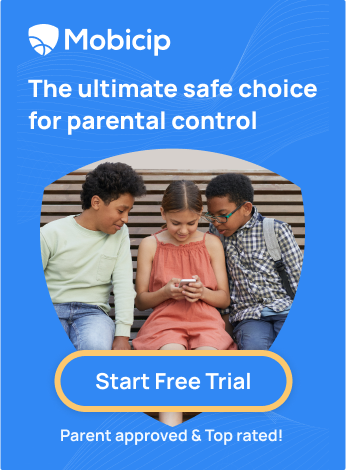Why should parents monitor their child online activities?

Parenting involves a lot of creativity. Around two-thirds of parents in the US say parenting their kids is harder today than it was 20 years ago, with many citing technologies like social media account or smartphones as a reason. Whether we like it or not, digital is the future and screens are here to stay. In the US, almost every child owns a phone or a tablet. Besides entertainment, the young children need it for school, homework, learning, and other activities. Like the real-world, technology is also a world with its set of bad and good and as a parent, we have to be mindful of our child’s online safety. And that can only be possible if we enter and navigate into their world. You can shrug off your shoulder and say, “Not me!” but here’s why you should monitor your child’s online activity.
Disturbing videos:
According to Phew Research, 80% of all parents with young children aged 11 or below in the US say their child watches videos on YouTube, with 53% reporting that their child does this daily, including about a third who say this happens several times a day (35%).
The girl with blood oozing down her mouth and cuts all over – remember how disturbed you felt after viewing the scene? Children are in no way immune to inappropriate content. YouTube’s recommendation algorithm may show videos that are whitewashed as kid-friendly. Your kid might be watching Peppa Pig, but it's not “real.” Peppa Pig's visits to the dentist stirred a controversy. The video was fake, disturbing, and horrifying that can abuse any child. Like Peppa Pig, several pseudo cartoons are trending on the internet.

Inappropriate sites:
Today’s children live in a digital world. The community the kids belong to is a digital one. Is supervision of your child's online activity possible at all times? Nope! Not at all. So let’s take a look at their online behavior that we as a parent won’t approve of:
-
31% listened or downloaded music online that has adult words
-
21% watched adult television programs or movies online
-
6% used credit cards online without parental consent
Even an innocent search in Google can make our child land into a forum where they discuss hate and self-harm. A pop-up can lure children to share personal details or download malware to the system. With Chabots and endless content, the possibility is very high for our young children to fall into prey.
Excessive screen time:
On average, kids aged 8-12 spend 4 to 6 hours a day watching or using screens, and teens spend up to 9 hours! Besides online safety risks, it’s the health of our children which is at stake with excessive internet usage. Does your child find it difficult to focus on studies? Is his or her attention span very short? Maybe it’s time for you to start monitoring your child's online activity. Sitting at a corner of the house and surfing the internet for long hours make our children physically inactive. Not to forget their binge eating! Devices have somehow hypnotized our children, they no longer desire any interaction and engagement with anyone. All they care about is looking at the screen and anticipating what’s next.

Addictive games and apps:
In the US, children (ages 5 to 8) spend 40 minutes, and tweens (ages 8 to 12) spend close to 1 hour 40 minutes every day playing online games. Online games can be single-player or multiplayer. While playing a game with many players, children come in contact with strangers. Child predators can randomly post hate messages, sexually harass and criticize children and may use avatars and pseudo names to remain anonymous. Thus our children, both young kids and older teens, become victims of cyberbullying. Children playing violent games become aggressive and agitated in their behavior and fall victim to online addiction. And once addiction creeps in, they lose their thinking ability and give in to unpleasant acts. Many apps and games also require access to their cellphone’s data, camera, and contacts. Children may unknowingly disclose all personal information, not only of their but also of their parents, relatives, and friends.
Online privacy violations:
Many internet marketing techniques target children and collect their personal information from websites without any parental notification. Hence, the US government introduced the Children’s Online Privacy Protection Act (“COPPA”) that specifically aims to protect the privacy of children under the age of 13 by requesting parental consent for the collection or use of any personal information of the users. However, several lawsuits were against social media apps and websites for violating COPPA regulations in collecting personal information of kids.
How Mobicip can help you monitor without being a helicopter parent?
Over 2 million parents trust Mobicip to protect their child online and develop healthy digital habits. Mobicip’s parental control software has an intuitive dashboard with real-time alerts and easy to use interface and with its advanced features, you have everything you need to get that perfect peace of mind about your child’s digital safety. Also, no child likes to be monitored all the time. Mobicip is a COPPA compliant software that allows parents to customize settings and set up controls on your child’s device respecting the privacy of your child.
Here’s what you can do with Mobicip:
-
Set limits for daily screen time and create schedules for your child
-
Block potentially harmful apps and websites
-
Receive real-time alerts on inappropriate activities and interactions on social media app
-
Track the location of your child instantly
-
Create geofences and receive alerts of their whereabouts
-
Co-ordinate and interact with your child and a co-parent (spouse or a family member)
-
View data on internet usage and online activities from an intuitive dashboard

Here’s all you have to do – sign up and set up your child’s devices. And there you go! If you haven’t tried Mobicip yet, try it free by taking advantage of the 7-day free trial. If you are in the process of setting up your devices and need help, please feel free to get in touch with our customer care team.
Parenting Matters!
Our children need us to help them grow and develop as responsible and valued citizens.
Also read: How can parents prevent teen suicide?







